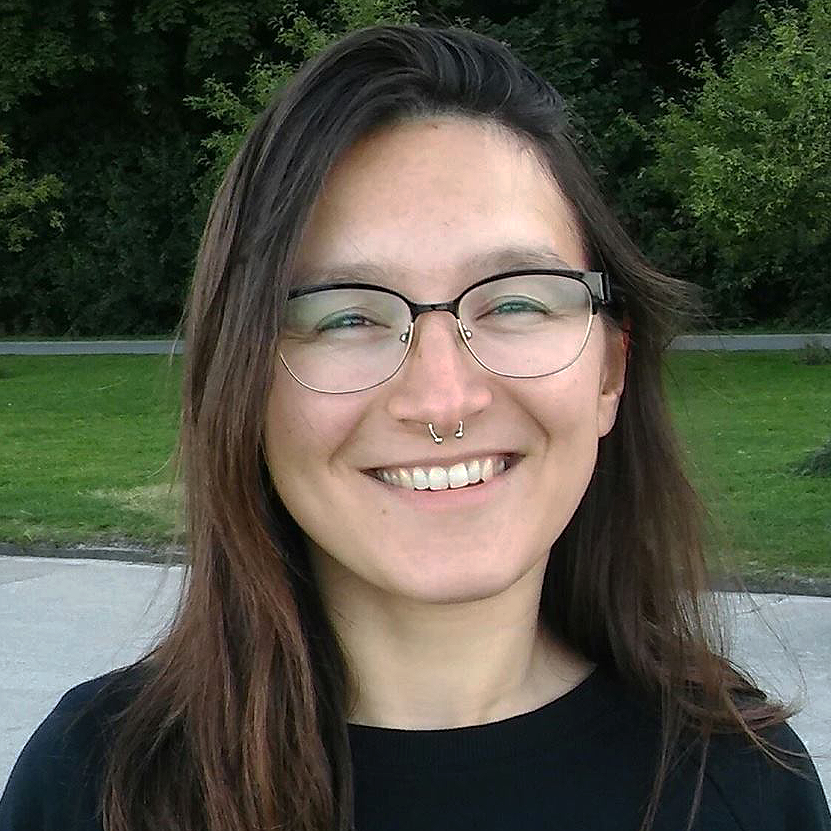dr Natalia Pamuła

email: nm.pamula@uw.edu.pl
profile: ORCID
Room 3.055
Office hours in Spring semester 2025/26:
Tuesdays: 11:20 – 12:20
Assistant Professor at the ASC, graduated from the Department of Comparative Literature at the University at Buffalo (SUNY Buffalo) in 2018. Her research interests include disability studies, American and Polish literature, gender studies, mad studies, environmental studies, and discard studies. She publishes on the cultural history of disability and representations of disability in Polish literature. She co-edited, with Marta Usiekniewicz and Magdalena Szarota, a special issue of Studia de Cultura 10(1)/2018 devoted to disability studies in Poland. She’s the Polish translator of Extraordinary Bodies: Figuring Physical Disability in American Culture and Literature by Rosemarie Garland-Thomson, which came out in 2020 with Fundacja Teatr 21. She’s an ally of people with disabilities and she combines academic work with activism.
Role at the ASC
Co-cordinator of the Transatlantic Symposium
Co-chair of the Gender/Sexuality Research Group
Achievements
National Science Center research grant, Neurosis in Polish Culture and Psychiatry, 1956-1989 (OPUS, 2026-2030)
2023 The Ministry of Education Scholarship for Young Outstanding Scientists
2022 University of Warsaw Rector’s Award for the Publication Record
National Science Center research grant, Disability in Polish Culture After 1989 (SONATA, 2021-24)
2020 University of Warsaw Rector’s Award for the Publication Record
Publications
“Symbiotic citizenship and a struggle for the right of life as frames for interpreting the 40-day disability protest in the Polish Parliament”. Rethinking Disability and Human Rights: Participation, Equal Status, and Citizenship, red. Inger Marie Lid, Edward Steinfeld, Michael Rembis, Routledge (forthcoming), co-authored with Magdalena Szarota
“Ordinary Trauma: Twenty-One Disabled Women Surviving the 1989 Polish Transformation.” Aspasia: The International Yearbook of Central, Eastern, and Southeastern European Women’s and Gender History 16, no. 1 (2022): 130-148.
“Kalekie świadectwa. Niepełnosprawność i protesty w Polsce 2018-2020.” Przegląd Kulturoznawczy 50, no. 4 (2021): 698-714.
“Violent Inclusion: Disability and the Nation in Polish 1950s and 1960s Young Adult Literature.” East European Politics and Societies and Cultures 34, no. 4 (2020): 858-878.
“Czy adoptowałeś już niepełnosprawne dziecko?”: Przyczynek do analizy niepełnosprawności w dyskursie pro-choice w Polsce. Teksty Drugie 2 (2020).
“Maternal Impressions: Disability Memoirs in Socialist Poland.” Aspasia: The International Yearbook of Central, Eastern, and Southeastern European Women’s and Gender History 13, no. 1 (2019): 95-112.
“Precarious Belonging: Blindness, Masculinity, and Work in Polish Young Adult Literature of 1970s and 1980s.” Canadian Slavonic Papers 61, no. 2 (2019): 186-202.
Book translation: Extraordinary Bodies: Figuring Physical Disability in American Culture and Literature by Rosemarie Garland-Thomson into Polish (Niezwykłe ciała: przedstawienia niepełnosprawności fizycznej w amerykańskiej kulturze i literatururze, wyd. Fundacja Teatru 21, 2020).
Courses (selected)
Madness in American Culture
Designing Access: Body, Disability and Technoscience in American Culture
Waste Matters: Trash and Disposability in the US
Writing American Life
Introduction to Disability Studies
Unruly Women in American Culture
New American Intimacies